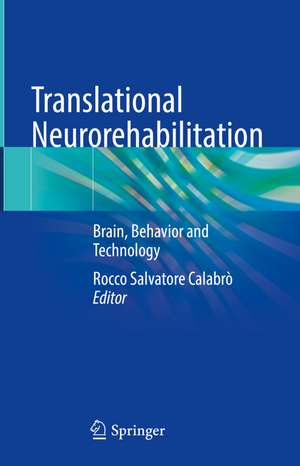Translational Neurorehabilitation: Brain, Behavior and Technology
Editat de Rocco Salvatore Calabròen Limba Engleză Hardback – 14 oct 2024
The book is aimed to expand the current understanding of brain function and disease by evaluating preclinical and clinical trials on neural plasticity and functional recovery after nervous system disorders. Also, it disseminates the knowledge coming from novel therapies, including advanced robotic and ICT-based applications.
The book will be of interest to neuroscientists, physiatrists, neural engineers, and clinical neurologists.
Preț: 1036.12 lei
Preț vechi: 1090.66 lei
-5% Nou
Puncte Express: 1554
Preț estimativ în valută:
198.26€ • 206.100$ • 164.09£
198.26€ • 206.100$ • 164.09£
Carte disponibilă
Livrare economică 14-28 martie
Preluare comenzi: 021 569.72.76
Specificații
ISBN-13: 9783031636035
ISBN-10: 3031636031
Pagini: 251
Ilustrații: Approx. 250 p. 20 illus.
Dimensiuni: 155 x 235 mm
Greutate: 0.54 kg
Ediția:2024
Editura: Springer International Publishing
Colecția Springer
Locul publicării:Cham, Switzerland
ISBN-10: 3031636031
Pagini: 251
Ilustrații: Approx. 250 p. 20 illus.
Dimensiuni: 155 x 235 mm
Greutate: 0.54 kg
Ediția:2024
Editura: Springer International Publishing
Colecția Springer
Locul publicării:Cham, Switzerland
Cuprins
Introduction to translational neurorehabilitation.- 1. Brain injury, neural plasticity and neuromodulation.- 2. Brain, behavior and cognition: from lesion to rehabilitation.- 3. Motor behavior in individuals with central nervous system lesions.- 4. Functional neuroimaging and rehabilitation.- 5. Movement analysis: toward a real clinical use.- 6. Robotics: from research to clinical practice.- 7. Virtual reality in neurorehabilitation: is it time to go beyond research?.- 8. Overground exoskeletons: research, rehabilitation and/or assistive tools?.- 9. Wearables, sensors and soft robotics.- 10. Telerehabilitation in the neurological field.
Notă biografică
Prof. Calabrò is neurologist, with a PhD in Psychiatric Science, and a specialization in Bioethic and Sexology; Also, he is Assistive Professor of Physical Medicine and Rehabilitation at Messina University. Since 10 years, he moved into the neurological rehabilitation field, focusing on patients suffering from acquired brain injury. In the last years, as Head of the “Behavioral and Robotic Neurorehabilitation Laboratory of the IRCCS Neurolesi (Messina, Italy), he has demonstrated growing interest in innovation technology, with regard to robotic assisted ambulation and virtual reality. At the same time, he has been actively involved in the management of neurogenic and iatrogenic sexual dysfunction. He is peer referee for many international journals, and part of the Editorial Board of Medicine, Brain Sciences, Medical Sciences, Frontiers in Neurology, Neurorehabilitation and Journal of Man’s Health.
Textul de pe ultima copertă
This book focuses on rehabilitation demonstrating how translational research may help clinicians in boosting neural plasticity and functional recovery. Translational Neurorehabilitation is a new interesting field that seeks to produce more meaningful, applicable rehabilitation results that directly enhance human health, performance and quality of life. As neurological diseases increase with age and people who survive a brain injury are rising, thanks to the improvement of intensive acute care, the need to appeal to neurorehabilitation will double in the next few years. Motor, cognitive and behavior approaches have changed over the years and novel tools to treat brain and spinal cord injury should be validated before translating them into clinical practice.
The book is aimed to expand the current understanding of brain function and disease by evaluating preclinical and clinical trials on neural plasticity and functional recovery after nervous system disorders. Also, it disseminates the knowledge coming from novel therapies, including advanced robotic and ICT-based applications.
The book will be of interest to neuroscientists, physiatrists, neural engineers, and clinical neurologists.
The book is aimed to expand the current understanding of brain function and disease by evaluating preclinical and clinical trials on neural plasticity and functional recovery after nervous system disorders. Also, it disseminates the knowledge coming from novel therapies, including advanced robotic and ICT-based applications.
The book will be of interest to neuroscientists, physiatrists, neural engineers, and clinical neurologists.
Caracteristici
Shows how brain-behavior interaction is fundamental to properly address rehabilitation Presents novel therapies, including advanced robotic and ICT-based applications Expands current understanding of brain function and disease
